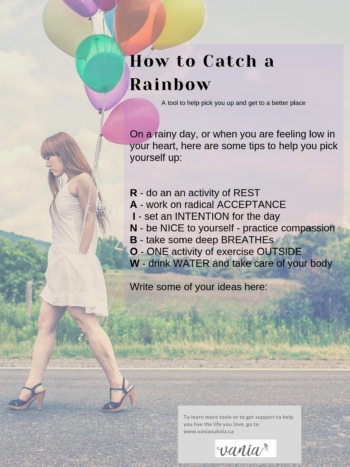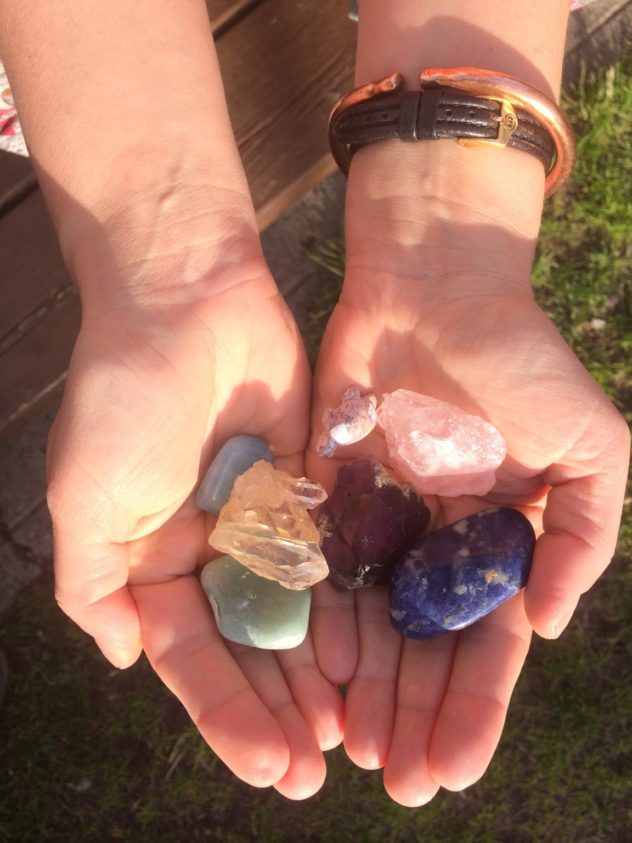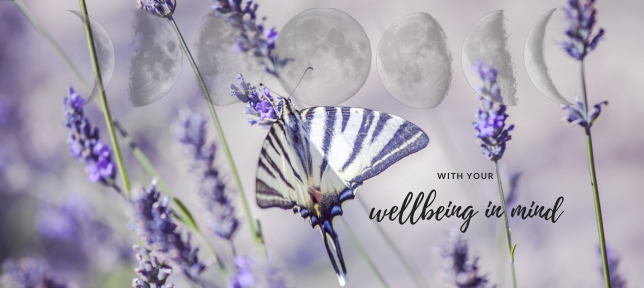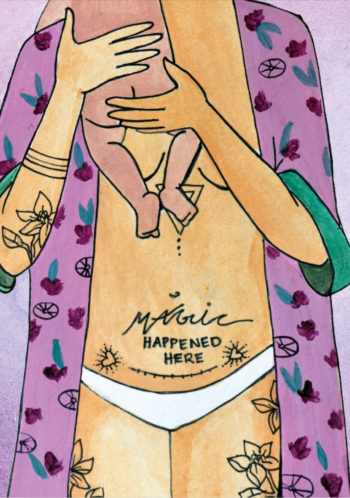May is a busy month, with various key dates of celebration and recognition. Over the course of the month, i am going to share with you some tools and suggestions. First up, in honour of Maternal Mental Health Week, here is a tool that i put together. After studying both Dialectical Behaviour Therapy as well as more somatic/body-based self-compassion modalities, i find this tool can be helpful to help you take control of your emotions. I love acronyms as it makes it so much easy to remember the suggestions. Plus it’s a helpful reminder that we can be in control of our feelings.
It can be hard to take time for yourself, especially when we are told to take care of others and that it’s selfish to do kind things for ourselves. This tool can be a great way for you to steal some moments to yourself, in an intentional way. It also can manifest some good feelings that linger. Rainbows are incredible symbols of everyday magic or woo woo, and taking time to notice the joy and beauty in the everyday helps us with our emotional well-being. We deserve to notice these moments, and deserve to take time to pause. I also find the analogy of getting through to the other side of a storm, or getting to back home (over the rainbow) as reference. If you’d like your own worksheet version, go to my Toolkit Handouts here page and make a copy – you can put it up on your fridge as a reminder.

R – What is an activity of REST that you can take a break with
What are some ways you can rest and relax? We can only see rainbows when we are able to be aware of what’s in front of us. This is also a great way to notice what we need an a given moment. Reading is a great way for your brain to take a break from the monkey mind or inner critic. It is especially helpful when we are able to distract ourselves from the everyday worries and thoughts. You can get your dog-eared favourite book, or a new book that you have never read; it can be a fiction novel, self-help book, or a how-to book for something you want to learn. Take time to write in your own journal, free writing or following a guide. Or maybe you would rather watch a movie that you have never seen before – the idea is to let your brain relax and absorb what it is taking in, instead of the constant chatter it typically takes you to.
A – ACCEPT as you are – it is what it is
Radical Acceptance is a helpful tool to be able to acknowledge something for what it is. That doesn’t mean we have to truly agree with it, but the acceptance can be a first step to let things go. This stops the pain from turning into suffering, and it allows us to be more present with ourselves in the present. When we don’t accept something, it keeps us stuck. So, try working with this idea and practice saying “it is what it is.” See how that starts to feel in your body. Maybe some parts feel less stuck or tight.

I – What is an INTENTION that you can set for your day
Setting intentions for a day, a week, or a year can be a guide that sets you with following where your want your life to go. The intention can be a simple word that carries meaning for you, or a mantra/affirmation that holds significance for you. If you don’t already have one, take some time to journal and brainstorm the words and phrases that are meaningful for you. It is a good way of giving ourselves permission to focus on what we really want, and to take ownership of our moods and behaviour. Then work on ways to implement it into your everyday life. Maybe there is a symbol that speaks to you as a guide – be it a rainbow of hope and luck, a butterfly of resilience, or a lavender flower that helps you feel calm. When you have a symbol that acts as Recalled Anchor (i wrote about it more here) or resource, seeing it in your everyday life is a great way to boost your mood. This podcast that talks more about everyday magic and woo woo is a great listen!
N – Be NICE to yourself – practice self-compassion
Self-Compassion is not the same as self-esteem and yet they work well together. To have self-compassion, it implies that we need to treat ourselves with the loving kindness we give others when they need our support. Think of some ways to give yourself self-compassion – it can be a permission slip to eat some chocolate after a hard day, and to enjoy it without judgement. It can be to not do the dishes and instead watch some marathon TV. It can be a yoga stretch or dance to your favourite music. The compassion comes from reminding yourself that your matter and deserve this break.

B – Take time for yourself and Take some deep BREATHS
Slowing down in the here-and-now moment is a great way for you to catch your breath, and align your body with what your mind is focused on. It’s important to slow down and catch your breath. If it’s hard to do some breathes or meditation on your own, that’s okay – look up some great guided visualization apps or programs. Or, can you put your feet up and just take in the sights and sounds around you? Linger a bit longer in the shower, add some luxurious hand lotion to your sensory self-care. Have a cat-nap. Maybe treat yourself to a nice mala bracelet with your favourite crystal – this can be a calming tool and a way to practice some mindful meditation.
O – Go OUTSIDE and get some fresh air in your body
Research has shown links to fresh air, being outdoors and mental health. Our brains are elastic and benefit from the change in scenery as well as air changes. Sensorimotor Psychotherapy and Polyvagal theory also show us that a quick walk outdoors can do a lot to change our mood. Everything is better outside. Think of some simple things you can do – a walk, sitting on your porch our balcony, a picnic snack during your lunch break for instance. Another benefit to getting outside is that there may be other people that you can connect with – it helps us feel less alone or isolated after being indoors when feeling down. You don’t need to have a long chat with someone, but a quick hello can be a great break your mind and body needs too.
W – Drink a glass of WATER to refresh yourself – take care of your body’s basic needs
In keeping with Maslow’s Hierarchy of Needs, it’s imperative to take care of your basic needs. Research shows that we need to nurture our physical body in order to heal our mental health. Do a quick checklist – when was the last time you drank some water, had a healthy snack, slept enough, did some exercise for your body? If it’s been 2 hours since your last water break, have a glass right now. And then find ways to allow time for the other ways to take care of your body.


 I have mixed feelings about clubs. I never was a Girl Scout, in choir or on sports teams as a kid. I was a dancer though, but that doesn’t seem like the same kind of club or group like the others. For one thing, the rules and homogeneity that seemed to go along with it felt too forced. And just because one kid likes to play soccer, that doesn’t mean she likes the same music or food as another. And it felt like we had to be the same all the time, like Stepford Wives. I could be wrong though.
I have mixed feelings about clubs. I never was a Girl Scout, in choir or on sports teams as a kid. I was a dancer though, but that doesn’t seem like the same kind of club or group like the others. For one thing, the rules and homogeneity that seemed to go along with it felt too forced. And just because one kid likes to play soccer, that doesn’t mean she likes the same music or food as another. And it felt like we had to be the same all the time, like Stepford Wives. I could be wrong though.  Here’s why our well-intentioned comments about someone else’s experience can be problematic: it doesn’t take into account their potential birth trauma and how it’s linked to consent and body trust issues. We hear about birth trauma that relates to obviously upsetting experiences of injury or even infant death. But another type of birth trauma is one where the birther has their voice taken from them, and instead the medical expert is calling all the shots. When some of us have experienced sexual violence and later in life get pregnant, this new experience can bring up former body memories and triggers.
Here’s why our well-intentioned comments about someone else’s experience can be problematic: it doesn’t take into account their potential birth trauma and how it’s linked to consent and body trust issues. We hear about birth trauma that relates to obviously upsetting experiences of injury or even infant death. But another type of birth trauma is one where the birther has their voice taken from them, and instead the medical expert is calling all the shots. When some of us have experienced sexual violence and later in life get pregnant, this new experience can bring up former body memories and triggers.